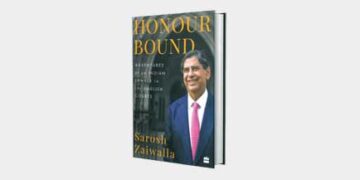I had got to know Dadi after a dinner hosted by John Major in 1990. Dadi came to introduce himself and told me that he would like to be invited to future such high-profile events. He claimed to be one of the richest men in the world. He invited me to Singapore, and the next time I was there for a client’s case he took me to lunch at a swanky restaurant. ‘That is my regular seat,’ he said, pointing to a chair. He always talked like that, ever out to impress with his worth and importance.
While much of Dadi’s talk was bombast, I enjoyed his company and I had been fascinated to learn that Mehernosh had tried to start a business with financial support from him. And since Mehernosh did not tell me why the proposal was refused, I was curious to know what it was about and whether it would work. I had every reason to believe that despite his claims of vast fortunes, Dadi probably didn’t have spare money to finance it in the first place.
Mehernosh had told me that he had been looking for $5 million from Dadi, but when he came to me he was looking for three times as much. ‘Find me $15 million,’ he told me. ‘We will make money. You will never have to work again. I will manage it and we will share all benefits and profits I make equally. The plan was that we would become ship owners. We would buy old ships, hire them out and earn from freight charges. That, though, would not fetch significant profits. The big money, Mehernosh claimed, would come from selling the ships when the market went up.
Having told Mehernosh originally that I had no chance of finding that kind of money, suddenly, thanks to Ajitabh’s offer, my circumstances had changed significantly – the money might be available after all. I discussed it with Ajitabh, who came back to me the next day. ‘That’s approved,’ he said. ‘You did not let us down’. Receiving a reward for winning a case is not unheard of.
The money is recorded in the firm’s books and tax paid on it as applicable. So, if either Rajiv Gandhi or the Bachchans rewarded me for winning the latter’s case, this would have been perfectly above board. And I was used to clients promising me future riches once a case was over, even if my experience was that these promises came to naught- (The only exception was a Pakistani rice trader who offered a $50,000 reward, and this was paid because it came as part of the $900,000 cargo damage claim settlement that came into Zaiwalla & Co.’s client account.)
Some six or eight weeks after our victory, Ajitabh came for his usual evening rendezvous at my office and said, ‘Sarosh, I have told you I will keep my word. The Bachchan family thanks you for what you have done. The money has arrived.’ He didn’t say from where it came. He just told me, ‘These are our personal funds. This $15 million is Bachchan money and we are keeping our word. You have cleared our name, our family name. We will put it in the business of your choice and you will receive the income from it.’ There was clearly a contradiction. Originally, he had told me Delhi had agreed to this money.
By ‘Delhi’ I understood him to mean Rajiv Gandhi. If Delhi was Gandhi, then was not the $15 million also Gandhi’s or the Congress party’s money? In the legal action in London, the court was told the Bachchan wealth came from Bollywood and IPCA, a pharmaceutical company in India owned by the family. It did not come from Bofors. So, when Ajitabh said it was Bachchan money I did not pursue the matter. Whose money it really was would have dramatic consequences later.
At this point though, the question was not the source of the $15 million but where it would be invested. I outlined Mehernosh’s project and Ajitabh’s response was that it seemed fine and he requested a meeting. Once Ajitabh and Mehernosh met, sure enough the money was produced. Knowing I had no previous experience in business, Ajitabh said he would manage the business for me and I agreed. In effect, we went into a partnership. Mehernosh said he wanted 40 per cent and the rest was mine, but with Ajitabh taking the responsibility of managing my share of the business, he asked for 40 per cent in his name so that he could control Mehernosh.
The result was that on paper I ended up with only a 20 per cent share; with Ajitabh becoming the de facto majority shareholder.
In any case, I was not party to discussions with Mehernosh when the sharing arrangement was agreed. Besides the 40 per cent equity interest, Mehernoshs company, Constellation Ship Management, was to receive over $200,000 per month for managing our ships.
A $100 company called Delta Shipping was incorporated in the Bahamas. Dennorkse Bank, a Norwegian shipping bank with a branch in London, lent $15 million to match our investment, and the business was soon up and running. I would go for some meetings but played no active part in running the company and had no powers. I was content with this arrangement because at that time I trusted Ajitabh without any hesitation. In any case, I had no choice because the money never came to me, it went directly into Delta Shipping. Mehernosh and Ajitabh ran the business and got along very well.
Mehernosh was an energetic, pleasant person with plenty of ideas. As a qualified seagoing captain, he always had an ambition to be a ship owner and was determined to organize everything. It was just after the first Gulf War and so was the right time to buy ships as prices had fallen. The first two ships were purchased from Greek companies and the third from a Korean one. The first Greek ship, Lokris, cost $3.5 million and was renamed Avon Delta, while the second one cost $4 million and was renamed Nile Delta. Both were handy-size ships, able to carry around 23,000-24,000 tons.
The third and much larger vessel was a Panamax costing $22 million called Good Leader, which became Ganges Delta.
She could carry 100,000-120,000 tons. As a silent partner, I was supposed to have fewer worries. It seemed all I had to do was attend dinners. Despite having made my reputation as a shipping lawyer, Delta Shippings legal requirements were entrusted to a different law firm because Mehernosh wanted it this way and I had no objections.
A surprising turn
My first inkling that something was amiss came some months later when I got a call from Sinha Reshamwala, who had an Indian shipbroking company in London. I had always felt a bond with him, for just as I was the only Indian who owned a law firm in the City of London, Reshamwala’s company, Faircastle, was the only Indian independent shipbroker.
What Sinha told me came as a shock, ‘Sarosh,’ he said, ‘You are a rich man now. I did not realize you would do this.’ When I asked him what on earth he was talking about, he said, ‘I am talking about ballooning and the kickbacks you received when you bought Lokris. As you know, Sarosh, this is a closed market, so we know what is going on.’ ‘Ballooning’ is when you buy a ship for a certain amount, but you tell the seller to give an invoice for a higher sum for the lending bank’s purposes and you take the difference. I knew some Greeks used ballooning to secure higher bank funding. Sinha revealed that Lokris actually cost much less than $3.5 million, as I had been told. The implication would be that Mehernosh must have pocketed the rest.
I immediately spoke to Ajitabh, but he told me to ignore such talk. I now suspect Ajitabh knew what was going on and was a participant too. I would never have agreed to be a part of such malpractice, but then I was kept entirely in the dark and knew nothing of it. I accepted Ajitabh’s advice, but soon after the $22 million vessel Good Leader was bought, Mehernosh acquired a palatial house in the very upmarket Virginia Water near London for £2 million (or possibly more).
He told me he had recently inherited some money from an elderly aunt in Australia, but I didn’t believe him and demanded a meeting with both my business partners. Mehernosh was furious about my allegations and Ajitabh again suggested I let it be. Instead, I put my foot down. I don’t like people not being straight with me.
After that I would send notes to Mehernosh asking him to tell me about Delta Shippings transactions. He would send my letters back unopened and then stopped talking to me altogether. In 1993 Ajitabh came to me and said it was best if legally he took over my share in Delta Shipping, so I would not have to have further dealings with Mehernosh. Perhaps I was naive, but I had not invested any of my own money and so agreed to the proposal and retired from the partnership.
Mehernosh had proved to be a complete let down, changing diametrically once the seed money had arrived. But despite all the fuss, my relations with Ajitabh had remained strong. We were still joined at the cummar and he continued to come to my home for dinner.
Not long after, Ajitabh told me he was closing down the shipping business but that he would invest the money in London properties in our joint names and share the benefits equally. I had no option other than to believe him and said fine (although this was never to happen). I have had no communication with Ajitabh since that last meeting back in 1993. I was still under the impression it was Bachchan money. Later, I was to discover whose money it really was. For now, though, I was to learn a far more shattering truth about my marriage.


















